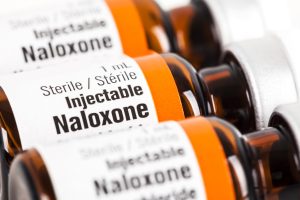 Naloxone, also known by the brand name Narcan, is a Food and Drug Administration-approved medication that can rapidly reverse an overdose from opioids such as oxycodone, fentanyl, methadone, or heroin. It is an opioid antagonist that works by blocking the effects of these drugs on the brain and restoring normal breathing.
Naloxone, also known by the brand name Narcan, is a Food and Drug Administration-approved medication that can rapidly reverse an overdose from opioids such as oxycodone, fentanyl, methadone, or heroin. It is an opioid antagonist that works by blocking the effects of these drugs on the brain and restoring normal breathing.
An opioid overdose can occur as a result of illicit drug use, when a person accidentally takes an extra dose of their prescription, or when someone mixes opioids with certain medications or alcohol.
Naloxone should be given immediately to someone who is showing signs of an opioid overdose, and 911 should also be called right away. Signs of an overdose include:
- Breathing that is slow, abnormal, or has stopped
- Bluish nose or lips
- Discolored fingernails
- Pin-point sized pupils
- Cold or clammy skin
- Not waking or responding to touch or voice
Naloxone can be administered by nasal spray, or it can be injected under the skin or into the muscle. It can also be given intravenously. This medication is often used by paramedics, emergency medical technicians, or police officers. Families or loved ones of those who struggle with addiction to opioids are also encouraged to have naloxone nearby.
There are a few things to keep in mind when using naloxone:
- Naloxone is only effective if opioids are present in the body; therefore, it cannot be used to reverse an overdose caused by other drugs such as cocaine.
- Naloxone is a temporary treatment that works to reverse an overdose in the body for only 30 to 90 minutes. Therefore, a person may still experience the effects of an overdose after the medication has worn off. This is why it’s important to call 911.
- Multiple doses of naloxone may be needed for stronger opioids like fentanyl.
- A person should be monitored constantly after naloxone is given and until emergency care arrives.
According to the New York City Department of Health, New Yorkers can get naloxone without a prescription at community programs throughout the City. A list of these programs can be found by visiting health.ny.gov/overdose or calling 311. The agency also provides a list of participating pharmacies on its website, nyc.gov/health/map.
If you or someone you know is struggling with addiction, Flushing Hospital Medical Center’s Reflections Treatment Program utilizes a holistic model to treat addiction. To learn more about our program or schedule an appointment, please call (718) 670-5078.
All content of this newsletter is intended for general information purposes only and is not intended or implied to be a substitute for professional medical advice, diagnosis or treatment. Please consult a medical professional before adopting any of the suggestions on this page. You must never disregard professional medical advice or delay seeking medical treatment based upon any content of this newsletter. PROMPTLY CONSULT YOUR PHYSICIAN OR CALL 911 IF YOU BELIEVE YOU HAVE A MEDICAL EMERGENCY.
